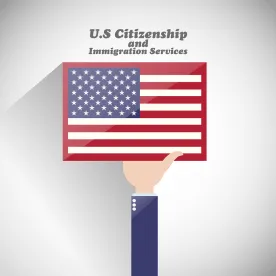On May 3, 2022, U.S. Citizenship and Immigration Services (USCIS) announced a Temporary Final Rule that temporarily increases the automatic extension period for employment authorization and Employment Authorization Documents (EADs) from 180 days to 540 days. This policy will take effect on May 4, 2022, and will grant an automatic extension of up to 540 days to certain EAD renewal applicants with a timely filed Form I-765, Application for Employment Authorization renewal application pending during the 18-month period after publication of the rule. EADs authorize the employment of such foreign national workers for a specified period of time.
Eligible applicants include those who:
-
Have properly filed Form I-765 for a renewal of their employment authorization and/or EAD before their current EAD expired, and
-
Are otherwise eligible for a renewal in that:
-
The renewal application was filed under a category that is eligible for an automatic 180-day extension, such as the spouse of a principal E nonimmigrant, the spouse of a principal L-1 Nonimmigrant, spouses of certain H-1B principal nonimmigrants, and those pending adjustment of status, etc.; and
-
The category on the current EAD matches the “Class Requested” listed on the Form I-797C Notice of Action.
-
Noncitizens with a pending EAD renewal application whose EAD has expired and whose 180-day automatic extension has already lapsed will be granted an additional period of employment authorization and EAD validity, beginning on May 4, 2022, that will last up to 540 days from the expiration date of their EAD. These noncitizens may resume employment if they are still within the up-to-540-day automatic extension period and are otherwise eligible. Noncitizens with a pending renewal application still covered under the 180-day automatic extension will be granted an additional up-to-360-day extension, for a total of up to 540 days past the expiration of the current EAD. Noncitizens with a valid EAD and a pending renewal application on May 4, 2022, or noncitizens who timely file an EAD renewal application before Oct. 27, 2023, will be granted an automatic extension of up to 540 days if their EAD expires before the renewal application is processed. This automatic extension period ends upon notification of a final decision on the renewal application or the end of the up-to-540-day period after the expiration date on the applicant’s EAD, whichever comes first.
USCIS has faced increasing backlogs of EAD applications, worsened by the Coronavirus (COVID-19) pandemic that caused the government to temporarily close U.S. consulates and immigration offices. The closures, staffing shortages, and severely reduced capacity caused by COVID-19 have culminated in an unprecedented backlog of 1.5 million EAD applications, which has left thousands unable to work legally and has exacerbated labor shortages. Though delays at the agency stretch far beyond merely EADs, this new rule aims to address USCIS’ ever-increasing pending EAD caseloads, allowing the agency the opportunity to address staffing shortages and implement additional efficiencies toward the goal of achieving a three-month cycle time for EAD applications by the end of Fiscal Year 2023. The new rule will help avoid gaps in employment for noncitizens with pending EAD renewal applications and avoid further disruption for U.S. employers.
On October 27, 2023, automatic extensions of employment authorization and EAD validity will revert back to the up-to-180-day period for those eligible applicants who timely file Form I-765 renewal applications.




 />i
/>i
